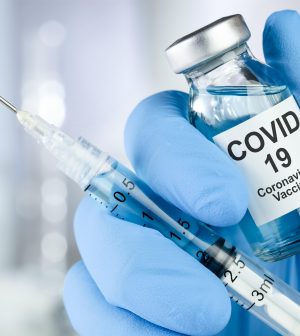- The Best Time of Day to Drink Bone Broth to Maximize Health Benefits
- 8 Ways to Increase Dopamine Naturally
- 7 Best Breads for Maintaining Stable Blood Sugar
- Gelatin vs. Collagen: Which is Best for Skin, Nails, and Joints?
- The Long-Term Effects of Daily Turmeric Supplements on Liver Health
- Could Your Grocery Store Meat Be Causing Recurring UTIs?
- Are You Making This Expensive Thermostat Error This Winter?
- Recognizing the Signs of Hypothyroidism
- 10 Strategies to Overcome Insomnia
- Could Artificial Sweeteners Be Aging the Brain Faster?
Pfizer’s Updated Booster Targets Omicron Variants, New Data Confirms

New trial data shows that Pfizer’s updated COVID booster shot is more powerful against Omicron subvariants than the original shot, the company announced Thursday.
The findings are reassuring, since human data on the tweaked vaccine was not available when the U.S. Food and Drug Administration approved the reformulated booster shots in September.
“These early data suggest that our bivalent vaccine is anticipated to provide better protection against currently circulating variants than the original vaccine and potentially help to curb future surges in cases this winter,” Pfizer CEO Albert Bourla said in a company news release.
Blood samples taken from 80 people one week after they received their updated boosters showed “a substantial increase” in their neutralizing antibody response against the two Omicron subvariants, BA.5 and BA.5, that now account for 93% of all new U.S. COVID cases.
The researchers did find that the antibody response in people over 55 was “more limited” when faced with the Omicron variants. The company is conducting a similar comparison among younger adults.
Pfizer has also been testing the updated booster in mice. In that research, it found that the new shots provided at least “incremental benefit.”
While Moderna, the only other company with an updated COVID booster shot, has released results from its own mouse study, it has not commented on when it will have updated effectiveness data from human clinical trials, CBS News reported.
When the federal government approved the boosters in September, they did so with the hope of getting ahead of a winter surge of the virus. At that time, advisers on the U.S. Centers for Disease Control and Prevention vaccine advisory panel shared reservations they had about allowing boosters without the data in humans.
Still, FDA officials stressed that other vaccines are tested in the same way.
“We’re pretty confident that what we have is very similar to the situation that we’ve done in the past with influenza strain changes, where we don’t do clinical studies for them in the United States. We know from the way the vaccine works and from the data that we have that we can predict how well the vaccine will be working,” the FDA’s Peter Marks said in August.
Additional human clinical trial data is necessary before shots from the primary COVID-19 vaccination series can be changed. The FDA may convene a panel of vaccine advisers later this year to address this issue, CBS News reported.
More information
The U.S. Centers for Disease Control and Prevention has more information on the updated boosters.
SOURCE: Pfizer Inc., news release, Oct. 13, 2022, CBS
Source: HealthDay
Copyright © 2026 HealthDay. All rights reserved.










